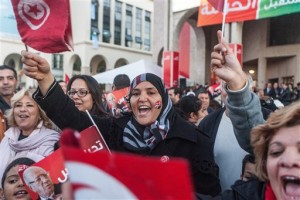TUNIS, Tunisia — An 88-year-old political veteran has been elected president of Tunisia, a country whose young people once electrified the world by overthrowing its 73-year-old dictator in 2011 and triggered the Arab Spring uprisings across the region.
The election result is a measure of Tunisia’s yearning for a return to stability: After four hard years of democratic transition, violence and economic crises this one-time revolution of the youth has turned to a symbol of the old regime.
Beji Caid Essebsi won 55.68 percent of the vote according to Monday’s results and campaigned on restoring the “prestige of the state,” evoking the legacy of Tunisia’s founding father Habib Bourguiba who built the country, educated its people but brooked little opposition.
Essebsi defeated the human rights activist who became the interim president after the revolution, Moncef Marzouki, who took 44.32 percent of the vote. Exit polls had predicted similar results soon after the voted ended Sunday night.
Alone among the countries that experienced the pro-democracy uprisings of the Arab Spring, the transition in Tunisia has remained on track but it has still been buffeted by the turmoil in the region, which brought down the Islamists that first won elections after the revolution.
As the economic problems mounted and radical extremists began assassinating politicians in 2013, the moderate Islamist Ennahda (Renaissance) party and its ally Marzouki lost popularity.
“It’s the failure of Marzouki that made Essebsi look like a statesman that would help Tunisians face and cope with these major challenges,” said Kamel Labidi, a former journalist and freedom of expression advocate, explaining the popularity of Essebsi and his party Nida Tunis (Tunisia’s Call).
He cautioned, though, that many in Nida Tunis, a loose collection of old regime officials and trade unionists, do not have a reputation for caring about human rights and Essebsi himself never spoke out against the autocratic rule of Bourguiba or his successor Zine El Abdine Ben Ali.
The victory of Nida Tunis in parliamentary elections in October will give Essebsi unprecedented power to shape the country, as he will dominate both the executive and legislative branches.
Economist Ezzedine Saidane said that is a good thing in light of the titanic economic challenges the country is facing, including high inflation, unemployment and public debt, with low foreign investment and a weak banking sector.
“The two executives (president and prime minister) working together in a harmonious manner will be extremely important for a successful transition to stable institutions and a healthy democracy,” he said.
U.S. President Barack Obama congratulated Essebsi on his election and the country’s transition to democracy in a statement issued by the embassy in Tunis.
“The strong commitment by Tunisia’s leaders and the Tunisian people to inclusive political dialogue, consensus-building, and democratic values has been crucial to the success of the political transition and will be equally important during the next phase,” he said.
Reconciliation may well be an early priority for Essebsi. After claiming victory Sunday night, he reached out to Marzouki’s supporters and called on them to work with him to rebuild the country.
Sarah Feuer of Washington Institute for Near East Policy discusses Tunisia elections
CCTV America interviewed Sarah Feuer of the Washington Institute for Near East Policy about the election win of Tunisian president-elect Beji Caid Essebsi and the impact it will have on Tunisia.

William Lawrence of GW Univ. discusses Tunisia elections
CCTV America also interviewed William Lawrence, a nonresident Senior Fellow at the Project on Middle East Democracy and a visiting professor at George Washington University’s Elliott School.

 CGTN America
CGTN America Supporters of Beji Caid Essebsi react outside his party headquarters after he was elected Tunisian President, Monday Dec. 22, 2014 in Tunis. Tunisia’s election commission says the 88-year-old former government minister Beji Caid Essebsi has won the presidential runoff with 55.68 percent of the vote. Outgoing interim president Moncef Marzouki received 44.32 percent of the vote. (AP Photo/Ilyess Osmane)
Supporters of Beji Caid Essebsi react outside his party headquarters after he was elected Tunisian President, Monday Dec. 22, 2014 in Tunis. Tunisia’s election commission says the 88-year-old former government minister Beji Caid Essebsi has won the presidential runoff with 55.68 percent of the vote. Outgoing interim president Moncef Marzouki received 44.32 percent of the vote. (AP Photo/Ilyess Osmane)
